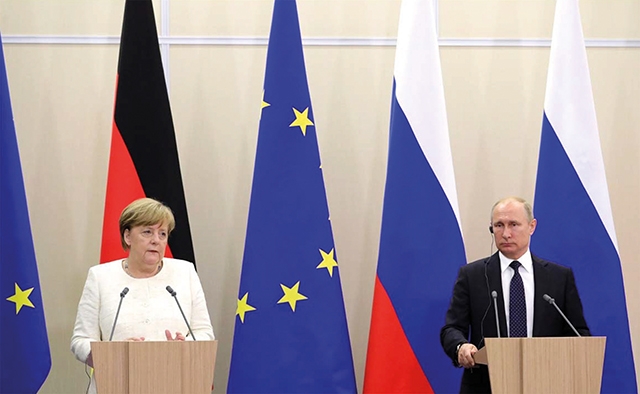Nord Stream is a Bad Dream, & Europe Needs to Wake Up
Op-Ed
Gas pipelines into Europe are generally seen in a negative light by the modern populace due to our increased understanding of modern environmentalism. The idea of a land littered with energy-gathering wind turbines and solar farms brings a glitter to most progressive energy-minded European eyes. While natural gas energy is still not without its merits, sustainability is one among many factors to be considered. Recently however, so is Russian influence in the region.
In this next segment of European-Russian relations, and the complex issues that have plagued that relationship, Germany is now under heavy critical pressure. In the wake of the poisoning of Alexei Navalny, the Counter-Putin politician now in a German hospital, tensions have once again risen. However, this rise is different for one major reason. Russia is now reaching out of its borders in another attempt at attaining further influence, through the Nord Stream 2 natural gas pipeline.
Nord Stream 2 began its evaluation stage in 2011, and in 2015 the plan was ready for implementation. Poland soon blocked this in 2017, and Nord Stream AG was forced to operate on its own, with only financial backing from other European companies. Next, the US imposed crippling sanctions on not just Nord Stream AG and its Russian project partner, Gazprom, but any company that so much as touched the project. Soon, key underwater construction companies such as Allseas Group S.A., began slowly backing towards the exit. As a result, Russia was left on the gas pipeline playground with no friends.
But Russia isn’t done yet. They’ve introduced a ship, the AKADEMIK CHERSKIY, to be tasked with installing the remaining pipeline. Docked in Mukran, Germany, the ship needs to undergo a major refitting project to be up for the new tasks. As a result, the German port involved, as well as the government, is under fire for hosting this aspect of the condemned project. Now that it seems Russia is on the hook for finishing the project, they will have to perform the tasks otherwise handled by experienced and highly-specialized contractors.
Clearly, there is a litany of problems with this. The Russians involved with the project have no experience with the tasks required to complete the project. The companies that walked out were specially equipped and trained to lay, install, test, and complete the pipeline. The environmental repercussions of this could be catastrophic, to say the least. As an added worry, the area is still known to have its share of WWII unexploded ordinance still populating the seafloor.
All this together, the Nord Stream 2 pipeline influence reaches global stages when the peripheral consequences are considered. Gazprom, a majority state-owned natural gas giant, stands to reap millions from the completion. Buried under layers of transactional covers, much of the money used to fund the rapid military modernization and territorial incursions Russia has been engaged in recently has been made possible using funds brought in from ventures like this. Incursions including Abkhazia and South Ossetia.
Many Europeans are aware of this. Among the biggest detractors of this project are the Poles, who still remember all too well the sight of Soviet T-55 tanks in their streets. While at first this may seem farfetched in our modern era, the residents of Eastern Ukraine and the villages in Georgia’s own South Ossetia must have had similar thoughts. Doubling the European dependence on Russian energy resources gives the control to Putin. This control puts the yoke around the EU’s neck, and pulls them farther from western society in the long term.
The ripples of this reaches even Georgia. The desires for Georgia to become closer politically, culturally, and economically with the West, particularly the EU itself, is not missed by anyone. Moving the EU closer to the Kremlin is not going to help with any of that. If the EU is more and more beholden to the whims of Russia, the plan to gradually include the Georgians drifts farther and farther until, sometime in the near future, it simply falls off the table. If this happens, there is no outside support besides the US and Japan, both of which are geographically incapable of responding to emergencies.
Some may argue that Georgia is better off with the support of Russia, since the West has been so slow in its inclusion plans. It’s true that the West moves slower, much of this based on its fundamental political structures and inherent caution about making quick decisions. But Russia offers nothing. The battered spouse should never return to the abusive (and genocidal at times) Soviet husband.
The stability of the West is more important than any quick and temporary fix. Losing the EU to the Russians will tear the world apart in more ways that could be calculated. The US loses a series of important allies (and a continent of friendships); the Chinese lose their massive investments in Georgia; Japan loses an economic partner; and the list goes on. Nord Stream 2 is more than just an energy resource problem; it’s a global strategy problem that must be avoided. Georgia has to make its voice heard on an issue that will surely impact them.
By Michael J. Godwin
Image source: kremlin.ru












